|
“Wow, you got your hands full.”
If you’re a parent, it’s possible that you have heard this statement thrown in your direction before. My wife and I, as we approach our seventh wedding anniversary, have three children. I find it amazing when people say “you got your hands full” when I am only holding one of my children. Imagine if they saw me when all three were climbing on me at the same time, or when they’re hungry and in a seemingly rehearsed chorus they ask for different foods in harmony. With the Third Extraordinary Synod of Bishops set to meet this Fall, Pope Francis and bishops from around the world will be discussing issues related to marriage and family life. I believe that the Catholic Church’s vision for married life offers a fresh and engaging perspective for our contemporary world. St. John Paul II declares, “The communion of love between God and people, a fundamental part of the Revelation and faith experience of Israel, finds a meaningful expression in the marriage covenant which is established between a man and a woman” (Familiaris Consortio 12). The approaching synod has caused me to reflect on how I live my vocation to married life. In his book Divine Likeness, Cardinal Marc Ouellet suggests that since Vatican II and St. John Paul II, “the theology of marriage has been developed in terms of ‘gift’…” (Ouellet 150-151). Men and women are created in the image of God (cf. Genesis 1:26-27). One of the great theological insights of Vatican II was the idea that “man, who is the only creature on earth which God willed for itself, cannot fully find himself except through a sincere gift of himself” (Gaudium et Spes 24). Only through a gift of self can people find their true purpose and meaning in life. This is because a total self gift both participates in and manifests the divine life to which we’re invited. Many of us are familiar with St. John Paul II’s Wednesday audiences which have become what we call the “Theology of the Body.” The giving of oneself in marriage, including in the conjugal act, is discussed in terms of a total gift of oneself. In a marriage covenant, husband and wife can manifest Trinitarian love, and the communion to which all people are drawn. For a husband or wife to hold back anything would be a betrayal of the communion which they’re guided by the Holy Spirit to manifest. Cardinal Angelo Scola in The Nuptial Mystery draws from St. John Paul II’s “Theology of the Body” and describes how the perichoresis of the Triune God is based on total self-giving. This is described beautifully in the following: Communio personarum exists in its perfection in the Three in One, because the Father gives himself completely to the Son without keeping anything of his divine essence for himself… The Son himself gives back the same, perennial divine essence. This exchange of love between the two is so perfect as to be fruitful in a pure state: it gives rise to another person, the Holy Spirit (donum doni) (Scola, 131). The Father completely gives everything He is to the Son; the Son completely gives Himself back in totality to the Father. Their self-giving love is so total and so perfect that it is fruitful and a third Person arises, the Holy Spirit. Cardinal Scola makes the connection between this Trinitarian relationship and the relationship between husband and wife. A husband and wife can give a total gift of self, offering all that they are, and in the context of the conjugal act, it is possible that a new person can be created. But Cardinal Ouellet also mentions that whether or not a new child is conceived, the love of the spouses is fruitful in that they are manifesting the Trinitarian gift of self (cf. Ouellet 172). There is an element of sacrifice involved here. The spouses freely commit to each other, accepting the new life if God should bless them with a child. However, if a couple experiences difficulty in conceiving, they also accept the sacrifice associated with not being able to bear children. In both cases, the spouses who completely give of themselves in love have the opportunity to offer themselves as a spiritual sacrifice to the Lord (cf. Romans 12:1) and to participate in the economy of salvation by manifesting Trinitarian love through a gift of self. So my response to my interlocutors should be “Yes, I have my hands full: they’re full with my gift of self to the Lord. I give Him all that I am in loving surrender in an act of self-emptying gift-giving aimed at being drawn deeper into the mystery of the Trinitarian communio personarum, and this participation in the divine life penetrates who I am, giving me the grace and love to offer myself as a self gift to my wife.” Do you think that would get their attention? Either way, what is essential to remember is that God invites us to participate in His very own divine life and we can experience true love through sincere acts of self gift. Edward Trendowski is Coordinator for Catechetical Resources for the Diocese of Providence and teaches pastoral theology for Saint Joseph’s College Online. This blog post was first published on the St. Joseph’s College of Maine Theology Faculty Blog. Click here to learn more about our cooperative alliance with St. Joseph’s College Online
1 Comment
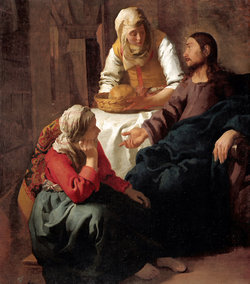 We’ve heard the story of Martha and Mary welcoming Jesus into their home. Martha is busy tending to hospitality needs while Mary listens to Jesus. Martha complains to Jesus requesting Mary’s help. Instead, Jesus answers, “Martha, Martha, you are worried and distracted by many things; there is need of only one thing. Mary has chosen the better part, which will not be taken away from her.” (Lk 10:38-42) As a young girl, I found the story of Martha and Mary difficult to understand. Growing up in a family valuing hard work, I often associated myself with Martha’s work ethic. I couldn’t figure out why Jesus would value inaction rather than work. Proverbs 12:24 says, “The hand of the diligent will rule, while the lazy will be put to forced labor.” But then I realized I had the point of the story wrong. Jesus’ response has nothing to do with working hard. It has everything to do with listening to his message. We can then see in ourselves what Jesus points out in Martha – we can be easily distracted and worried by tasks we need to accomplish in this world. Through Martha’s story, Jesus reminds us that there is one thing that is important: following Jesus’ message and his individual calling for each of us. In John 11:17-27, Martha meets Jesus as soon as she learns he is coming after hearing Lazarus has died. Immediately we see a change in this narrative of Martha. She purposefully goes to Jesus and when he asks her about his belief in him she responds, “Yes, Lord, I believe that you are the Messiah, the Son of God, the one coming into the world.” Next, Martha has the opportunity to serve Jesus six days after the Passover (John 12:1-8). She does so humbly and quietly. We come to understand Martha’s role is a different calling than Mary’s, much like in our own lives when those around us may not be called to the same occupations, tasks, talents, and other circumstances. Martha has chosen to serve with love instead of with bitterness and arrogance. Martha’s story gives us hope. Even though we can fall into the trap of trying to complete tasks on our own without God, there is opportunity for us to try again. When Jesus speaks to Martha, he is not unkind. His response is a loving one. As sinners we can only strive to learn and grow from our mistakes to make the next opportunity filled with Christ. Known as the patron saint of cooks, homemakers, and servants, St. Martha reminds us to thank those in our lives who serve us. This can be our parents or those who cook for us, those who work in public service, or even the waiter or waitress at our next restaurant meal. As a way to celebrate St. Martha’s feast day with our families this July 29th, we can pray to serve Jesus better: Saint Martha, pray for us that we might serve Jesus better. Help us to overcome our distractions and worries to listen to his words and be present to him this day. Amen. Dana Edwards is a recent graduate of the University of Florida. She currently resides in Tallahassee, Florida where she volunteers as a lector and with communication outreach at her local parish, Good Shepherd Catholic Church. As a fun activity to celebrate St. Martha’s feast day, I found this no-bake pumpkin pie recipe from Quebec named after St. Martha in my family cookbook, Cooking with the Saints: An Illustrated Treasury of Authentic Recipes Old and Modern
Tarte a la Citrouille Sainte-Marthe Serves 6 Ingredients: 3 eggs ¾ c. (200g) sugar 1 ½ c. (375g) pumpkin puree ½ c. (125ml) milk ½ tsp. salt ½ tsp. ginger ½ tsp. nutmeg ½ tsp. cinnamon 4 Tbsp. cold water 1 Tbsp. gelatin (1 ½ envelopes) 1 pre-baked piecrust If you have used sweetened pumpkin puree, reduce the amount of sugar in the recipe by half. Separate the eggs. Beat the egg whites until fluffy, add half the sugar and continue beating until smooth. Set aside. In another bowl beat the egg yolks with the other half of the sugar until the mixture thickens and becomes pale. Add the pumpkin puree, milk, salt, ginger, nutmeg and cinnamon. Continue beating until mixture is smooth. Transfer mixture to the top of a double boiler and cook it for 7-8 minutes until it thickens. Sprinkle the gelatin on top of the cold water and let it soak for 5 minutes. Add gelatin to the contents of the double boiler and stir until it is dissolved. Let the pumpkin mixture cool to room temperature, then carefully fold in the beaten egg whites with a spatula. Pour into the pre-baked piecrust and refrigerate for 4 hours or until firm and set. “The work of teaching is one of the most important in the Church.”
~St. John Baptist De La Salle Today, we often take for granted Catholic schools. Most likely either you or someone you know attended a Catholic school. A Catholic education is often seen as top quality, and Catholic schools are considered some of our finest places of learning. The modern concept of education dates back to the late 17th century France and one individual in particular: St. Jean-Baptiste de La Salle, founder of the Brothers of the Christian Schools. His work was not only revolutionary in method, but also unique in terms of educating the poor and underprivileged. Some 300 years later, de La Salle’s vision of educating those most in need remains strong in the United States through the Miguel model school. The Miguel school system was established in 1993 with the sole purpose of educating under-served children, focusing on students in middle school. The system was named after St. Miguel Cordero, a Christian Brother who dedicated his life to the education of poor Ecuadorians. Recent news about families and children fleeing their homes in Central and South American to find better educational and economic opportunities demonstrates that the need for quality education is as great today as in the time of St. Miguel. Here in Washington D.C., a Miguel school was established in 2002 as an extension of St. John’s College High School with 8 students – San Miguel School of Washington. It rapidly grew, and this past year the school graduated its largest class of 23 students and currently has a total of sixty-three Latino boys in grades six to eight. All San Miguel students come into sixth-grade from DC public schools and, on average, have reading and math skills of a fourth-grader. By the end of their time at San Miguel as eighth graders, they are 100% proficient in these subjects. [1] This success results from their own hard work and that of experienced teachers and tutors. Additionally, San Miguel, like most Miguel-style schools, operates on an extended day and year-round school program (200 school days vs. a traditional 160 days). This hard work pays off - 98% of San Miguel graduates have either completed their high school diploma or are in the process of doing so. The graduation rate for Latino males in DC public schools is 46% [2]. Clearly, San Miguel and its unique style of education is paying off. In addition to my role at the Catholic Apostolate Center, I work as an intern in the Development Office at San Miguel School. It has been an exciting time and a true blessing to work to make sure that San Miguel students receive the education they deserve. It has helped me to grow in trust for the good work that the Church does as a whole. We as Catholics have the obligation to serve others, as apostles of Christ. We have the responsibility to do our part in the greater effort of Christ’s mission. San Miguel School truly changes the lives of its students. By serving these at risk Latino boys, I know that I am changing the world and trying to do my part. Patrick Fricchione is the Research and Production Associate for the Catholic Apostolate Center and an intern in the Development Office of San Miguel School. [1] San Miguel School DC, website, sanmigueldc.org. [2] Statistic from the National Center of Education Statistics. 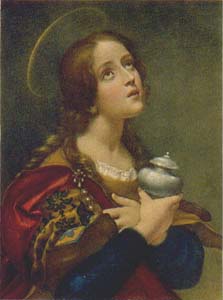 Today we celebrate the memorial of Saint Mary Magdalene. Many of us probably remember Mary Magdalene as one of the women who remained at the feet of Jesus throughout his suffering and death on the cross. Or, we might remember her as the first person to witness his Resurrection. Both roles are very important to consider as we examine the readings from today and their importance in recognizing God’s presence in our lives. Today’s Gospel from John focuses on Mary Magdalene’s visit to the tomb of Jesus. She arrives, finds it empty, and weeps. When confronted by Jesus, she can only say, “Sir, if you carried him away, tell me where you laid him, and I will take him.” Mary Magdalene is blinded by her grief, her own human failings, because in that moment, she believed her struggles were greater than God himself. She has forgotten Christ’s promise that he will rebuild this temple in three days (Cf, Jn 2:19). She, who sat at the feet of Jesus as he suffered on the cross, does not recognize that Christ is standing in front of her. We often go through life like Mary Magdalene, blinded by our everyday fears and hardships, but her life and her actions give us an example to follow. Though blinded by her own human failings, she learned to have faith and trust in the constant presence of the mercy and love of Christ. Christ says to her, “But go to my brothers and tell them, ‘I am going to my Father and your Father, to my God and your God.” With these words Christ proves to Mary Magdalene and to us that by his death and resurrection he has given mankind the ability to develop a personal relationship with God. Even after his death, he is calling Mary Magdalene and the disciples to more, to recognize that through his suffering on the cross he has transcended death and opened the gates of heaven to us. He calls us to renew our faith in him, “to my Father and your Father, to my God and your God.” He calls us into his arms, to know him, to love him, and serve him. This Gospel scene with Mary Magdalene reminds us that we are often blind to Christ’s presence in our lives. We sometimes forget just how significant his death on the cross actually was, we forget that he laid down his life so that we could overcome our daily struggle with sin and that we might one day be one with the Lord in heaven. This is a hard message to remember especially in these recent months in which a plane carrying 295 innocent people was shot down and people are being killed all around the world in the Ukraine, Israel, and Africa. Many of us feel lost and unable to help against this senseless violence and yet Mary Magdalene gives us the answer. That answer is Christ. He is always here for us. He is always present. We might not be able to see him at all times, for we are often blinded by our human failings, our pride, and our worldly desires, and yet Christ remains present to us. We have, like Mary Magdalene, to just open our eyes and trust in the Lord. We have to offer ourselves up as he did in the only way we know how, in imitating the life of Christ every day, first and foremost through prayer. By answering his call to know him, to love him, and to serve him we give ourselves completely to him just as Mary Magdalene did. St. Theresa of Avila gives us a simple prayer to remember the continuous presence of Christ in our lives, we but only have to look for him: Let nothing disturb you, let nothing frighten you, all things are passing away: God never changes. Patience obtains all things, whoever has God lacks nothing; God alone suffices. Nicholas Shields is a current District Deputy for the Washington, D.C. Knights of Columbus and a recent graduate of The Catholic University of America.
Who is stressed out? Anxious? Eager? Caught in this dreadful summer heat and growing tired of their daily routine? “Come to me, all you who labor and are burdened, and I will give you rest,” says Jesus in our Gospel today from Mt. 11:28-30. Who doesn’t like rest? It’s summer, we are in Ordinary Time, and it’s the middle of the week. I don’t know about you, but I could use a little spiritual-pick-me-up! The long days of childish summers spent without a care in the world are gone, and schedules, busyness, and work have taken their place.
Where is God in your day? Is He in the woman at the desk next to you, the one who always greets you with a cheerful “Good Morning”? Is He in the children you see every day, the ones who gleam with such exuberant joy? Is He in the man who doesn’t walk by the homeless man, but generously hands him a full lunch and some change? Is He in the person others see in you? Is He in the rosary you keep in your pocket, but never use regularly? Is He in the daily readings you find here but would never consider forwarding to a friend that day? Is He in you? In today’s society, the world rushes from one thing to the next without hesitation or a second thought. It is often difficult to find a moment for ourselves, and those moments are often eaten up by technology or more busyness. What if we begin to use that moment to ourselves as a moment with Christ? That intentional moment could be found in prayer or contemplative silence, or it could be speaking or listening to those around us. What if we just closed our eyes, imagined Jesus with us, and sat with him for a while. Would your heart be open to listen or would it not even recognize Him with you? Today’s Gospel says, “Take my yoke upon you and learn from me, for I am meek and humble of heart; and you will find rest for yourselves. For my yoke is easy, and my burden light.” As we continue on this journey of the New Evangelization, we are called by the Holy Father to infuse our busy lives with the peace and love of Christ. In Christ’s peace we find His love, and in His love we find our peace. Krissy Kirby is a recent graduate of The Catholic University of America in Washington, D.C. with a degree in Early Childhood Education. "The fruit of sacramental life is both personal and ecclesial. For every one of the faithful on the one hand, this fruit is life for God in Christ Jesus; for the Church, on the other, it is an increase in charity and in her mission of witness" (Catechism of the Catholic Church 1134).
I am a liturgical - and sacramental - junky. Whether it be when the organ plays, the incense burns, wooden crosses process or babies cry- I love being part of liturgies! But my love of liturgy does not end with the communal gathering or the symbolic signs. Rather, the reason I love liturgy is that I believe, as Fr. Aidan Kavanagh, OSB, a liturgical theologian, put it, “liturgy is doing the world the way the world was meant to be done.” In the liturgy we are participating in the life of God. We are entering into, and living within, the eternal circulation of the Trinity’s love! But what does that actually mean? It means that we are not simply attending a gathering. We do not show up to another building for another event. It is not a lecture or a show. Rather it is a transformation of ourselves with our God, who is love, so we can go out and witness to that love and act out of it. This is why I love liturgy. It calls me out of myself. It shows me God acting in all things and then sends me out to be his hands and feet. Liturgy connects me to the Body of Christ and reminds me that I am to care for that body. It shows me that the world can be used to glorify God and that the world itself, being God’s creation, is a symbol of His active presence in my life. David Fagerberg, a professor of theology at the University of Notre Dame, illustrates this thought saying, “Water could be a sign of God’s love if I gave a cup of it to someone who is thirsty, but not if I use up on my golf course the water he needs for his vegetable patch.” Liturgy reminds and shows us how to act out of love, not pride; to live out of hope, not despair; and to be guided by compassion, not self interest. Pope Francis affirms that we must be a living Church: a Church for the poor, a Church that acts. He emphasizes that, “Jesus teaches us another way: Go out. Go out and share your testimony, go out and interact with your brothers, go out and share, go out and ask. Become the Word in body as well as spirit.” We encounter, learn and receive Christ in the Liturgy in order that might know Him and act as His Body for the world. This Sunday we must remember that we are participating in something that goes beyond the building, the preaching and the music. We must remember that we are encountering Christ and he is teaching us a way that asks us to share in his mission of building the kingdom of God by acting out of the truths of love, justice, kindness, and peace. Pam Tremblay is a collaborator with the Catholic Apostolate Center. She currently works at St. John's University in Queens, NY as Resident Minister for Social Justice. Editor's Note: This post was originally published on July 30, 2013 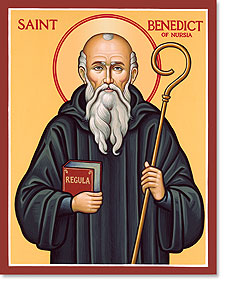 When you hear the word ‘hospitality’, what comes to mind? Like most people, I bet you think of hotels, or in some cases, you may think of that one aunt you have who always makes sure everyone’s glass is full and everyone has a seat. If you’re in ministry, ‘hospitality’ may now be synonymous with having coffee and light pastries at early morning meetings. But in a Benedictine sense, hospitality is very different. July 11th marks the Church’s feast of St. Benedict. In the early sixth century, St. Benedict wrote a Rule that he wanted his monks to follow. In 73 short chapters, St. Benedict tried to lay out an entire monastic way of life, so he certainly had a lot of ground to cover. He wrote about everything; from how an abbot should be chosen to how much monks were to eat and drink and where they were to sleep. He also devoted an entire chapter to how guests were to be received and treated. This whole chapter, which is quite brief, can be summed up in the first phrase the Founder writes, “Let all guests who arrive be treated as Christ…” (Ch. 53). Benedict goes into specifics on how guests are to be welcomed and fed, but it all goes back to Christ Himself saying “I came as a guest, and you received Me” (Mt. 25:35). St. Benedict understands, and wants his monks to understand, that Christ can be found in everyone. The first phrase of the last paragraph is a perfect summary of the Gospel message as well, “In the reception of the poor and of pilgrims, the greatest care and solicitude should be shown, because it is in them that Christ is received…” (Ch. 53). How do we treat the stranger on the street, the man selling us a magazine, the immigrant, or the receptionist? Remember also, this does not apply to just the stranger. How do we treat those that we see every day: the coworker, roommate, friend, or classmate? Are these people just a means to an end, are they here for our convenience or happiness, or are they Christ to us? Are we treating them as Christ incarnate or just as another person we have to deal with? Most likely we do not fall into either extreme, but every time we fall short of treating a person as Christ, we fall short of treating God as God. To be hospitable, we do not need to follow the exact instructions of St. Benedict. Our hospitality, like his, should be rooted in charity, in love. It can be quite simple: a smile, a since greeting, or the most common one at my alma mater, the holding of a door for a distant stranger. Hospitality is the easiest way to build up the Kingdom of God here and now. When we welcome the guest, greet the stranger, or feed the hungry, we are doing these things for both God and neighbor. By being hospitable, we are fulfilling the greatest commandment. Let us pray for the intercession of St. Benedict today, asking him to pray for us, that we may be hospitable, welcoming, and loving in every interaction we have. Michael Phelan is in his second and final year in the Echo Program at the University of Notre Dame. He is a graduate of Saint Anselm College, a Benedictine school, in Manchester, N.H.
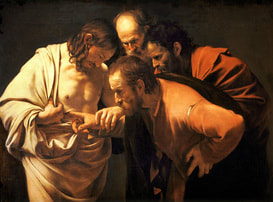 Poor Thomas! One remark by my namesake and he’s forever branded as “Doubting Thomas.” The Church doesn’t honor him each July 3rd for this, however, but for what is absolutely one of the most explicit Professions of Faith uttered in the New Testament: “My Lord and my God!” (see John 20: 24-29, c.f. Luke 7:1-10) In those five words, Thomas boldly expresses his revived belief in his resurrected Master and testifies to His divinity, ready to once again follow Christ and evangelize the world about Him. While this redeeming witness is indeed memorable, it is important to not lose sight of another of Thomas’ statements as recorded in John’s gospel, which shows us more about his personality and in turn, our own faith in Christ, “the assurance of things hoped for, the conviction of things not seen” (Hebrews 11:1). This other mention of Thomas occurs when Jesus decides to travel to the village of Bethany in Judea to raise Lazarus, thus coming dangerously close to Jerusalem (see John 10:22-39, c.f. Mark 10:32-34). Remembering how the Jews there had earlier tried to stone Jesus, the disciples must have felt apprehensive about undertaking such a risky journey (see John 11:8). Thomas, however, seeing Jesus’ determination, exhorts them saying, “Let us also go, that we may die with him” (John 11:16). Brave words for a doubter! Pope Benedict XVI even characterized Thomas’ sincere resolve to follow his Master as something which is “truly exemplary and offers us a valuable lesson: it reveals his total readiness to stand by Jesus, to the point of identifying his own destiny with that of Jesus and of desiring to share with him the supreme trial of death” (September 27, 2006 General Audience). This is the very definition of the Christian life! A life with Jesus is to be with Him through times of joy, peace, hope, success, and prosperity, as well as uncertainty, loss, sorrow, ridicule, and persecution. This is “no sugarplum” as Benedict describes it in Jesus of Nazareth (pg. 67), but without Christ what can one hope for to carry him or her through the trials of life? What would be the point in continuing on? In his final five words recorded in the Bible, Thomas redeems himself after doubting Christ by exclaiming “My Lord and my God!”. The wounds he touched confirm, undoubtedly, the Identity of Christ, the truth of His Message, and the authenticity of God’s infinite Love, not just for Thomas, but all believers! St. Augustine comments on this: Thomas “saw and touched the man, and acknowledged the God whom he neither saw nor touched; but by the means of what he saw and touched, he now put far away from him every doubt, and believed the other” (In ev. Jo. 121, 5). It is important to remember that Saint Thomas, like all the apostles, was personally chosen by Christ in spite of their weaknesses and lack of understanding. But Christ did not pick worthless men! Rather, their failings are a reminder that holiness is a gift from God and not a human creation, given to us, who have our own weaknesses, so God can transform them into the loving image of Christ and mature our faith. Jesus also permitted Thomas to doubt after the resurrection but did not abandon him in those doubts, instead allowing him to bear witness to the truth of the resurrection and thus verify the whole Christian message (see 1 Corinthians 15:14). Finally, we are called to not give in to our doubts regarding God, our dignity and worth, or even hard Church teachings no matter how unpopular they may seem! By looking to Saint Thomas as a model (and by praying to him for guidance), may we find comfort in our insecurities, hope in the future, and the encouragement to persevere through the difficulties of life on the way to our final rendezvous with our Lord and our God. Thomas Wong is an undergraduate student at The Catholic University of America and a member of the Catholic University Knights of Columbus.
I spent my spring break in Diriamba, Nicaragua, living with abandoned special-needs children. The experience taught me more than I could ever say or write, but one person’s words and actions are still fresh in my mind.
Our guide Julia (pronounced who-lee-uh) was a no-nonsense woman who spoke heavily accented English. Understanding her was a twofold challenge. First was fighting through her accent, but second was following her train of thought. Julia was full of grand ideas; language was often an inadequate vehicle for the love she shared with everyone she encountered. Her sentences could ramble and her ideas could blur together, yet the message always rang true. Julia was the quintessential guide. She got us where we needed to go, naturally, but was always there to fill in the necessary information we lacked. She helped us understand Nicaragua in ways we could not have otherwise. Julia taught us something about wealth. When we saw families living in shacks unfit for an American dog, she taught us to see what they had, not what they lacked. Poverty forced families together, she said. Multiple generations lived together in the same home, spending their lives on the same minuscule pocket of land. We have technology, but how often did we see our families? How much did we truly love our closest relatives? Our hearts ached for the poor, but she reminded us of the powerful love coming from their poverty. Julia taught us about discipline. She worked alongside an amazing staff at Mustard Seed Communities, the organization that ran the orphanage where we stayed. Blessed with limitless patience, these women worked tirelessly caring for children who had no one else to care for them. For this to be possible, some level of order had to be maintained. The last day we were there, multiple kids were kept inside, unable to play with us or the other children. When it came time to say good-bye, Julia had to hold firm and keep the kids inside. Love is not always nice, and allowing the children free reign was no favor to them. Julia taught us about pride. Anywhere we went, she glowed as we took in the beauty of her country. Surrounding the poverty and hardship were spectacular views in the mountains, sandy beaches and a volcanic lake that was nothing short of paradise. The homes were bright and clean. No one had much, but what they had was theirs, and that meant something to them. Anytime we ate, she spoke of the national cuisine. They don’t cook with spice, they add it at the end, she said. She spoke of their national cheese, a salty, creamy white cheese served with plantains. She spoke of their national drink, the Macuá, which was a mixture of white rum, orange, guava and lemon juices. Her pride never boasted, only sought to show the beauty and the good in her country Julia taught us about love. Love is simple, yet strong. It is not always nice, but enables true care. It does not boast, but carries itself confidently. Love extends to every facet of life and extends to everyone encountered. Julia taught us all of this less with words and more with actions. She was ordinarily heroic, doing great things in simple ways. Time will erode many of the memories formed in Nicaragua, yet Julia will stand the test of time. I went to Nicaragua to help those in need, but I left finding I was in as much need as the people of Nicaragua, and most of those lessons came from Julia. Zack Lemon is a student at Ashland University in Ashland, Ohio and a student leader for the Campus Ministry Leadership Institute, sponsored in part by the Catholic Apostolate Center. This post originally appeared in The Collegian, the student newspaper of Ashland University. “Lead me in your justice, Lord” is the response from today’s responsorial psalm. It is a fitting tie-in, as we are days away from the conclusion of the Fortnight for Freedom, an effort sponsored by the United States Conference of Catholic Bishops to encourage all U.S. Catholics to not only recognize the freedom we already enjoy as citizens but to also recognize that there is still progress to be made.
Yesterday, a crucial step was taken towards the protection of religious liberty in the United States, as the Supreme Court released its decision in what has been known as the “Hobby Lobby” case. The court ruled yesterday that “closely held,” for-profit, corporations have the ability to opt out of the Department of Health and Human Services contraception mandate which was instituted as part of the Affordable Healthcare Act. This ruling protects the rights of private citizens to follow their religious beliefs and not be forced to violate them in their businesses. In a sense, this is exactly what the Fortnight for Freedom is all about, and it is appropriate that the decision was released in the middle of this Fortnight. The focus on religious liberty can often get lost in the heavily politicized nature of these debates. Many people forget that contraception is not the heart of the issue, but rather protecting the right of employers and religious institutions to follow their own beliefs. This is a polarizing issue, one which many people have strong opinions on. We hear the cry of religious liberty constantly and while it is imperative to continue the fight for this religious liberty, we as Catholics must remember that we are working to defend our right to make these important (and often controversial) decisions ourselves, through our own faith-formed conscience. The conclusion of the Fortnight for Freedom will be on July 4th, Independence Day. This is a time for us as a nation to come together to celebrate the country that we live in, imperfect as we often may be. We must remember the news reports which are filled with stories of religious persecution and humanitarian tragedies, and recall that we are blessed to enjoy the freedom we do have, the freedom that is one of the principles that this country was founded on. During these last few days of the Fortnight for Freedom, take some time to recognize what freedoms you are especially grateful for, and take a moment to pray the Prayer for the Protection of Religious Liberty: O God our Creator, from your provident hand we have received our right to life, liberty, and the pursuit of happiness. You have called us as your people and given us the right and the duty to worship you, the only true God, and your Son, Jesus Christ. Through the power and working of your Holy Spirit, you call us to live out our faith in the midst of the world, bringing the light and the saving truth of the Gospel to every corner of society. We ask you to bless us in our vigilance for the gift of religious liberty. Give us the strength of mind and heart to readily defend our freedoms when they are threatened; give us courage in making our voices heard on behalf of the rights of your Church and the freedom of conscience of all people of faith. Grant, we pray, O heavenly Father, a clear and united voice to all your sons and daughters gathered in your Church in this decisive hour in the history of our nation, so that, with every trial withstood and every danger overcome-- for the sake of our children, our grandchildren, and all who come after us-- this great land will always be "one nation, under God, indivisible, with liberty and justice for all." We ask this through Christ our Lord. Amen. Rebecca Ruesch is the Blog Editor for the Catholic Apostolate Center |
Details
Archives
July 2024
Categories
All
|
About |
Media |
© COPYRIGHT 2024 | ALL RIGHTS RESERVED


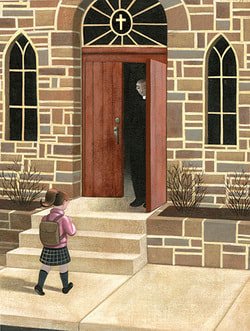

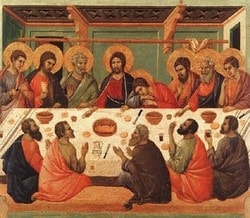
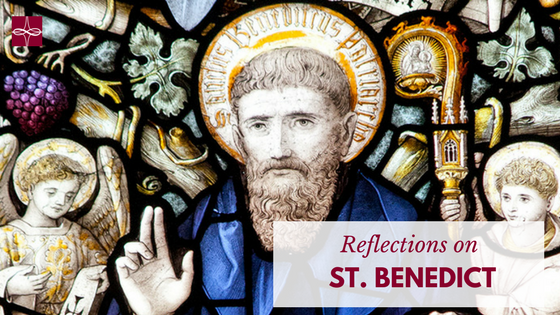


 RSS Feed
RSS Feed